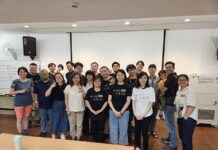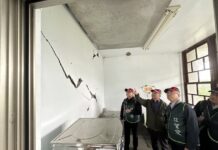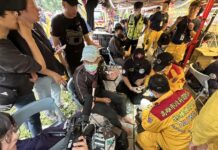July 11-17, 2011
Headline News
Indigenous artists and pastors express concern and displeasure at the “Meliwan Resort” project
Reported by Lin Yi-ying
Written by Lydia Ma
Several local Indigenous artists, including movie director Mayaw Biho, came together on July 10, 2011, to perform in an event sponsored by “Anti-Meliwan Resort Hotel Action Alliance”. The location of this concert was Sanyuan Bay in Taitung, the site where Taitung county government and some corporations are illegally building a resort. The artists used dance, songs, skits, and other forms of art to get their message through.
This controversy dates back to 2004 when the Taitung county government allowed the construction of the beachfront Meiliwan Resort Hotel on Shanyuan Bay. Not willing to give up their traditional domain and worried about the environmental impact that a large tourist resort would bring, Indigenous residents and environmentalists protested and filed lawsuits as soon as constructions began. But despite several court rulings against the project, the county government in partnership with corporations repeatedly, appealed these decisions while simultaneously proceeding with all the legal processes required for the resort’s operation.
Among those who attended this concert was Rev. Fa-dah, who brought 7 youths from her Aboriginal reservation with her to listen to the concert and support its cause. “I feel helpless and worried when I think about the future of Indigenous people!” she said.
“I don’t know what these youths think, but I know this is an opportunity to inform them and teach them,” she said, adding that youths usually are unaware of issues that deeply impact the livelihoods of Indigenous people, such as the East Coast Development Act and collusion between local governments and national corporations. She hopes that such opportunities will open their eyes to their people’s plight and strengthen their sense of ethnic identity.
Rev. Fa-dah explained that Indigenous groups usually don’t possess a strong sense of ethnic identity and tend to be easily misled into overlooking issues that are truly important, such as their rights. This case is a classic example, she said, because Indigenous groups usually have less education, financial resources, and professional know-how compared to the heads of big corporations or county governments. Consequently, they rarely get a good deal at the negotiation table, if there is any, and their lands and their livelihoods can be taken from them without much difficulty.
PCT Indigenous Ministry Committee Secretary Omi Wilang said that long before this illegal resort hit the news and grabbed the attention of some in Taiwan, PCT was already working with Indigenous people on it and helping them with various awareness-raising events.
Displeased that the Ma administration would disregard the rights of so many in Taiwan for the sake of “economic revitalization”, Omi Wilang reiterated that the PCT would stand with the people to the very end and because helping the oppressed is in agreement with PCT’s confession of faith.






